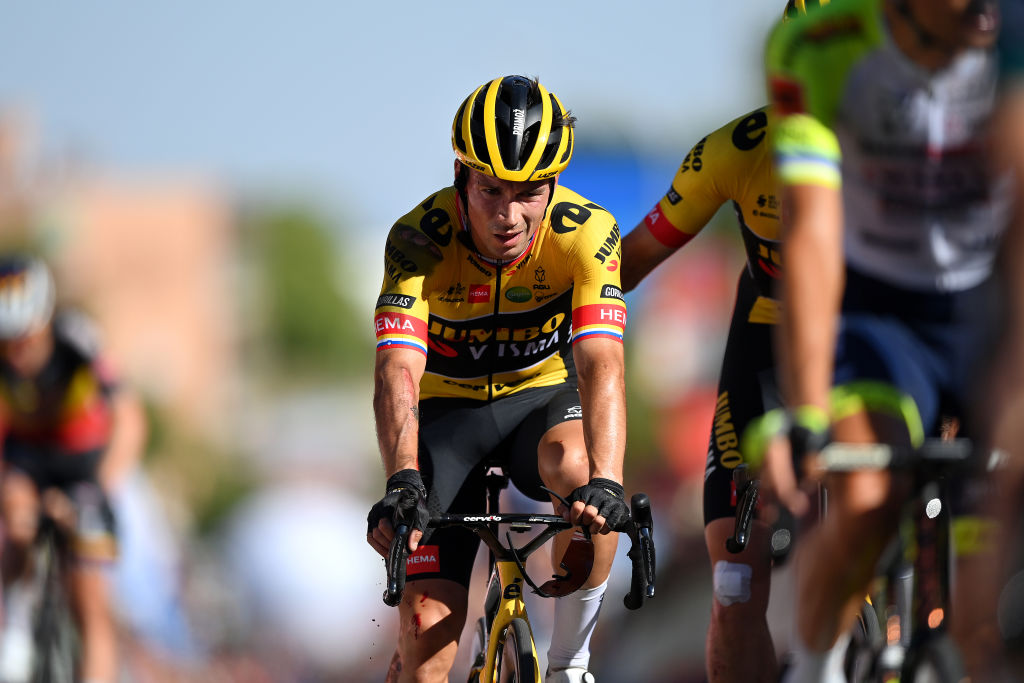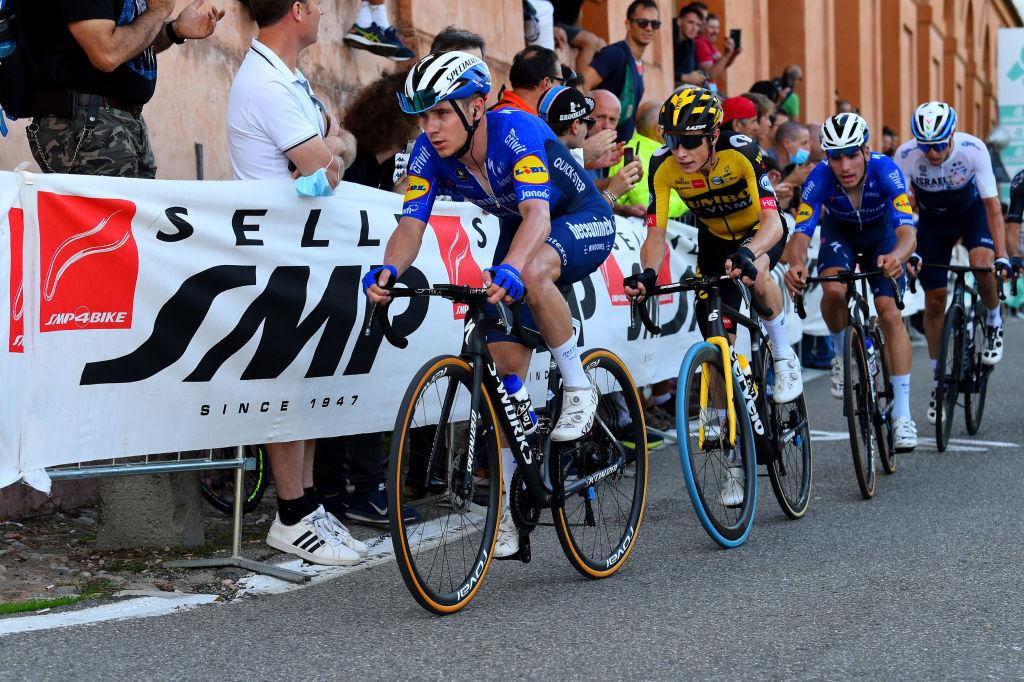Will Jumbo-Visma make history at La Vuelta a España with the first Grand Tour triple?
Dutch team could become first squad ever to win all three Grand Tours in a single season with Roglič and Vingegaard

It’s testament to the scale of what Jumbo-Visma have already achieved this season that if either Jonas Vingegaard or Primož Roglič manages to stand the tallest on the Vuelta a Espana winners’ podium next Sunday September 17th, the Dutch squad itself will have earned a place in cycling’s history books.
After Roglic’s last-minute but hardfought victory in the Giro d’Italia this spring over Geraint Thomas (Ineos Grenadiers), and Vingegaard’s more emphatic defeat of Tadej Pogačar (UAE Team Emirates) in the Tour de France, if either rider wins the Vuelta, Jumbo-Visma will become the first ever team ever to conquer all three Grand Tours in a single season.
No squad has come close, not even Team Sky during their golden era in the Grand Tours between 2012 and 2021.
The last team to win both Giro and Tour that managed to place a rider on the Vuelta podium, let alone win it, was Banesto in 1992, when Miguel Indurain did the so-called ‘double’ after teammate Pedro Delgado, back when the Vuelta was in April, had already finished third behind Tony Rominger in Madrid.
What's even more remarkable, is that the stakes for both Jumbo-Visma riders on an individual level in the Vueltal is almost as high. For Roglič a fourth victory in five years in the Vuelta would constitute a record-equalling achievement alongside Roberto Heras (2000, 2003, 2004 and 2005). The Slovenian would not only be one of two riders with a maximum of four Vueltas in his palmares, he would also be the first rider to take a Giro-Vuelta double since Alberto Contador in 2008. Vingegaard, meanwhile, would become the first rider to take the Tour-Vuelta double since Chris Froome in 2017 and just the second since Bernard Hinault in 1978.
Yet for all those achievements can hardly be underestimated, it’s perhaps the team record that stands the highest against the Spanish skyline this summer. While Sky and Ineos manager Dave Brailsford sometimes raised the possibility of securing the Grand Tour Grand Slam, in fact in 2018, when Sky took Giro and Tour with Chris Froome and Geraint Thomas, their best finisher in the Vuelta was David De La Cruz in 15th. Then in 2017, when Froome won both Vuelta and Tour, Sky’s best finisher in the Giro was Mikel Landa in 17th.
In recent cycling history, no team, then, has ever shown the potential to dominate three Grand Tours in the way Jumbo-Visma may yet do this summer on the roads of Spain.
Get The Leadout Newsletter
The latest race content, interviews, features, reviews and expert buying guides, direct to your inbox!
Furthermore, the Dutch squad already looked like one of the top squads in this year’s Vuelta thanks to the headline presence of four-times Grand Tour winner Roglič Roglic, whose track record of success this year at the Volta, Tirreno and the Giro means the Slovenian star has succeeded in winning every WorldTour race he has done this year. But the unexpected addition of Jonas Vingegaard to the Jumbo/-Visma Vuelta lineup, announced when he was on the point of conquering his second Tour, has just underlined that impression of overwhelming superiority even more.
Questionmarks ahead of records

In terms of race interest though, the good news is that both Roglič and Vingegaard, start the Vuelta with a certain number of questionmarks about their form and with radically contrasting backstories in the Spanish Grand Tour.
Roglič’s assured winning ride at last week’s Vuelta a Burgos, traditionally seen as the classic warm-up test for the Vuelta, confirmed his readiness of the challenge ahead. But regardless of his Burgos result, as a three-time winner of the Vuelta, Roglič starts the Spanish Grand Tour as far and away the most consistently successful performer in the last two decades in what is a notoriously unpredictable race.
Until Roglič scored his Vuelta triple, no rider since Roberto Heras had managed to win the Vuelta twice running let alone three times, and with 37 days in the race lead, only Alex Zulle, with 48 days, has spent more time on top of the Vuelta GC ranking than Roglič.
2022 was testament at how unwise it would be to rule Roglič out and how setbacks only seem to make him more determined to continue. Having crashed out of the Tour de France with two fractured vertebrae and a dislocated shoulder, Roglic’s potential to take on Remco Evenepoel and the rest of the favourites in the Vuelta that followed was far from clear.
But instead after Jumbo-Visma had claimed the opening TTT in Utrecht, the 33-year-old had won a tough uphill sprint stage into LaGuardia and spent a day in the lead. Then, even if Roglič was gapped by Remco Evenepoel in the hilly first stages and the Alicante TT, he subsequently bounced back with a vengeance on the toughest mountainous stages in southern Spain and began regaining time on the Belgian.
Crashing out at the start of the third week deprived the Vuelta of what could have been an epic final battle between Evenepoel and Roglič. But it does set the Slovenian up for an opportunity for sporting revenge in a race where the ‘what might have beens’ of 2022 can only be resolved, in part, with a bid for a fourth Vuelta victory against the same rider.
At the opposite end of the spectrum in terms of Vuelta experience, Vingegaard has only once ridden the Spanish Grand Tour, when as a little-known pro in 2020, he proved exceptionally strong on the second week climbs defending teammate Roglic’s lead. Since then Vingegaard has claimed two first places and a second in the Tour de France and is currently, as a result, the leading stage racer in the sport.
But his inexperience in la Vuelta is one potential chink in his armour and so, too, is the complete lack of specific preparation for Spain this Augsut. Roglič has been training at altitude in Tignes and comes in with a week-long stage race in Burgos to his credit. Vingegaard has avoided altitude camps and, barring a few criteriums, done no racing whatsoever since the Tour. At 26, his relative youth compared to Roglič may enable him to gain top form quicker. But maintaining that top condition throughout a Grand Tour is considered to be much harder without a solid training base, and if Vingegaard loses time early on, he may find himself struggling to regain contention.
Vingegaard versus Evenepoel

Yet if Roglič has plenty of targets in the Vuelta, so does Vingegaard and not just because it presents him with his first ever opportunity to take a Grand Tour victory other than in July. Quite apart from being a test of his degree of motivation to try for more Grand Tours wins other than in France, the Vuelta also gives Vingegaard the chance to measure his strength against the one top three-week contender in the current crop of top favourites he has yet to face: Remco Evenepoel (Soudal-QuickStep).
The last time the two crossed paths in any race was in Liege-Bastogne-Liege in 2022, which Evenepoel won and Vingegaard abandoned. With the two exceptions of Itzulia Basque Country that year, where Evenepoel took fourth and Vingegaard was sixth overall, and the 2020 Tour de Pologne, which Evenepoel won and Vingegaard was eighth, they have never crossed swords in any stage races and never raced in a Grand Tour together. The 2023 Vuelta then, represents an intriguing new challenge for both of them and one which will be seen as a key reference point for the 2024 Tour de France, too.
Vingegaard’s natural strength in the high mountains - and this year the route is far tougher than the 2022 Vuelta - could see him outpower the Belgian on setpiece ascents like the Angliru and Tourmalet. However, Evenepoel’s track record against the clock, which both acted as a major foundation for his success in last year’s Vuelta and in the first half of the Giro d’Italia this May, could see the recently crowned World TT Champion put Vingegaard on the defensive in the medium-length mid-race time trial in Valladolid.
Nor is Evenepoel the only serious challenger to the Jumbo-Visma hegemony by any means. In many ways the Vuelta is a rerun of the Giro d’Italia, given it will see all three podium finishers line up there - Roglič, Geraint Thomas (Ineos Grenadiers) and Joao Almeida (UAE Team Emirates), as well as the Belgian himself.
Enric Mas (Movistar) and Juan Ayuso (UAE Team Emirates), who stood alongside Evenepoel in the Vuelta’s final podium, will represent the home side, while Richard Carapaz (EF Education-EasyPost), the 2022 Vuelta’s King of the Mountains and a podium finisher in 2020 is yet another GC contender. Aleksandr Vlasov (Bora-Hansgrohe), Hugh Carthy (EF Education-EasyPost), Louis Meintjes (Intermarche-Circus-Wanty), Santiago Buitrago (Bahrain Victorious) and Thymen Arensman (Ineos Grenadiers) are all outside bets for potential GC bids.
Yet as soon as the curtain goes up on the Barcelona team time trial next Saturday evening, Jumbo-Visma will be the reference point and not just because they won the same opening stage last year in Utrecht and Roglic won the opening individual TT in 2021 in Burgos.
They also are fielding three of the last four Grand Tour winners, along with expert climbers like Sepp Kuss, present with Roglic at every Vuelta and Giro Roglič has won (four) and lost (two) as well as at all every Tour de France Jumbo-Visma have raced, with varying fortunes, since 2020. Robert Gesink, the Dutch veteran now taking part in his tenth Vuelta, including all four of Roglic’s, is another key name, while Wilco Kelderman and Dylan Van Baarle were both major factors in the 2023 Tour for Vingegaard this summer, and Jan Tratnik has a sporting debt to settle with Grand Tours after a training accident left him out of the Giro within hours of the countdown to the start on the Amalfi coastline.
With such a strong lineup, the key question, perhaps, for Jumbo-Visma is how Roglič and Vingegaard will race as a two-pronged GC challenge in the Vuelta. Roglič and Vingegaard last rode together in the Tour de France last year, where Rogličs early injury on the Roubaix stage largely confined him to a supporting role until he quit. Seeing how they collaborate will be one of the many plotlines of the 2023 Vuelta, and one of several that may not only affect the race outcome, but which could have an impact deep into the following season. First though, how they race together could be vital in shaping Jumbo-Visma's place in GrandTour history this September in Spain, and in gaining another major milestone for the Dutch squad, in what has already been a momentous year.
Alasdair Fotheringham has been reporting on cycling since 1991. He has covered every Tour de France since 1992 bar one, as well as numerous other bike races of all shapes and sizes, ranging from the Olympic Games in 2008 to the now sadly defunct Subida a Urkiola hill climb in Spain. As well as working for Cyclingnews, he has also written for The Independent, The Guardian, ProCycling, The Express and Reuters.
